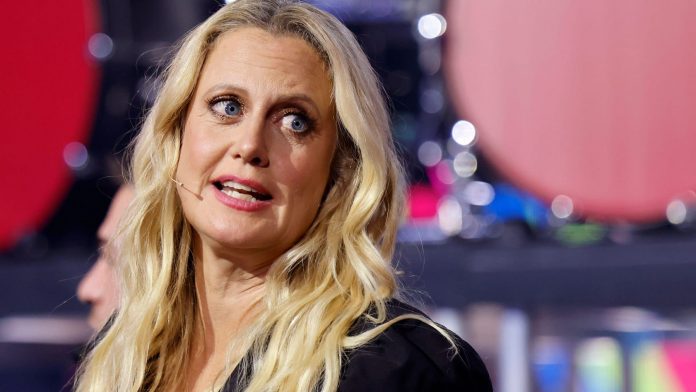Before the big finale, Barbara Schöneberger led the countdown. But the presenter remained silent about the big issues that overshadow the ESC.
This year's Eurovision Song Contest started promptly at 9 p.m. 25 countries will compete against each other in the world's largest music competition on Saturday evening. But before the ESC is broadcast for the 68th time, Barbara Schöneberger led through the countdown.
The 50-year-old, dressed in a pink and yellow dress, sat in a studio in Malmö, chatting with her guests Michael Schulte, Arabella Kiesbauer and Remo Forrer. Together they looked back on the past ESC years and also talked about the acts that will be on stage in the finale.
Vortex and the Netherlands and Israel
However, the presenter remained silent about two topics that have overshadowed the Eurovision Song Contest in recent days. On Friday, the European Broadcasting Union (EBU) announced that the Netherlands would not take part in the second rehearsal for the final.
A day later it was clear: Joost Klein was out. The musician was disqualified due to an incident with a camerawoman on Thursday evening. This news dominated the headlines hours before the final. Barbara Schöneberger, however, didn't mention the expulsion with a single syllable. Just like the criticism of the Israeli contribution.
Many were bothered by the fact that Russia was excluded from the ESC after the attack on Ukraine, but Israel was not excluded after the fighting in the Gaza Strip. Days before the final, demonstrators filled the streets of the Swedish city of Malmö, demanding Israel's exclusion from the competition.
This wasn't discussed in the ESC countdown either. There were critical words from the audience for this. “Typically, they put you in a good mood, as if nothing were wrong. The ESC is not what it should be. Stop it,” commented one user on Facebook, for example.
Video | Chaos at the ESC: boos and protests around the final
Source: Glomex
“It's simmering in Malmö…”
“Instead of the chatter just now, I would have liked an ARD 'Focus' from Malmö, with background information on the demonstrations, the disqualification of Joost and much more,” suggested one user. “It's simmering in Malmö and in the ESC community – and ARD doesn't bring anything except three minutes on the 'Tagesschau'.”
Viewers on X are also disappointed. “You can't be serious that 'ESC – The Countdown' doesn't talk about the events in Malmö that also happened outside of the actual show!” said one user.
Strict rules at the ESC
But why is neither the Joost Klein scandal nor the criticism of Israel discussed? Officially, the Eurovision Song Contest has nothing to do with politics. The competition rules also state, among other things, that “texts, speeches and gestures of a political nature are prohibited during the contest.” If a song contains political statements, it may be excluded from the competition.
The presenters of the Eurovision Song Contest also did not comment. However, Thorsten Schorn, the new commentator for Germany, said right at the beginning: “Whatever exactly happened between artist Joost Klein and a camerawoman, it's regrettable. Musically, it's a real shame for the competition and for the party song 'Europapa' .”


